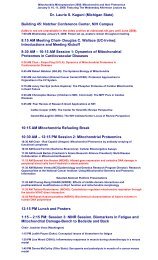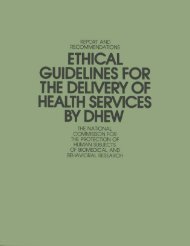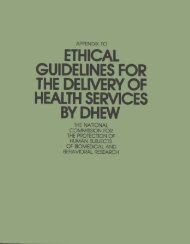RESEARCH ON THE FETUS - National Institutes of Health
RESEARCH ON THE FETUS - National Institutes of Health
RESEARCH ON THE FETUS - National Institutes of Health
Create successful ePaper yourself
Turn your PDF publications into a flip-book with our unique Google optimized e-Paper software.
The Commission has not yet studied the issues surrounding informed consent<br />
and the validity <strong>of</strong> proxy consent for nontherapeutic research (including the<br />
difficult issue <strong>of</strong> consent by a pregnant minor). These problems will be explored<br />
under the broader mandate <strong>of</strong> the Commission. In the interim, the Commission has<br />
taken various perspectives into consideration in its deliberations about the use<br />
<strong>of</strong> the fetus as a subject in different research settings. The Deliberations and<br />
Conclusions <strong>of</strong> the Commission regarding the application <strong>of</strong> general principles to<br />
the use <strong>of</strong> the fetus as a human subject in scientific research are as follows:<br />
1. In therapeutic research directed toward the fetus, the fetal subject<br />
is selected on the basis <strong>of</strong> its health condition, benefits and risks accrue<br />
to that fetus, and proxy consent is directed toward that subject's own welfare.<br />
Hence, with adequate review to assess scientific merit, prior research, the<br />
balance <strong>of</strong> risks and benefits, and the sufficiency <strong>of</strong> the consent process, such<br />
research conforms with all relevant principles and is both ethically acceptable<br />
and laudable. In view <strong>of</strong> the necessary involvement <strong>of</strong> the woman in such research,<br />
her consent is considered mandatory; in view <strong>of</strong> the father's possible ongoing<br />
responsibility, his objection is considered sufficient to veto.<br />
2. Therapeutic research directed toward the pregnant woman may expose<br />
the fetus to risk for the benefit <strong>of</strong> another subject and thus is at first glance<br />
more problematic. Recognizing the woman's priority regarding her own health care,<br />
however, the Commission concludes that such research is ethically acceptable provided<br />
that the woman has been fully informed <strong>of</strong> the possible impact on the fetus<br />
and that other general requirements have been met. Protection for the fetus is<br />
further provided by requiring that research put the fetus at minimum risk consistent<br />
with the provision <strong>of</strong> health care for the woman. Moreover, therapeutic<br />
research directed toward the pregnant woman frequently benefits the fetus, though<br />
it need not necessarily do so. In view <strong>of</strong> the woman's right to privacy regarding<br />
her own health care, the Commission concludes that the informed consent <strong>of</strong> the<br />
woman is both necessary and sufficient.<br />
In general, the Commission concludes that therapeutic research directed<br />
toward the health condition <strong>of</strong> either the fetus or the pregnant woman is, in<br />
principle, ethical. Such research benefits not only the individual woman or<br />
65











